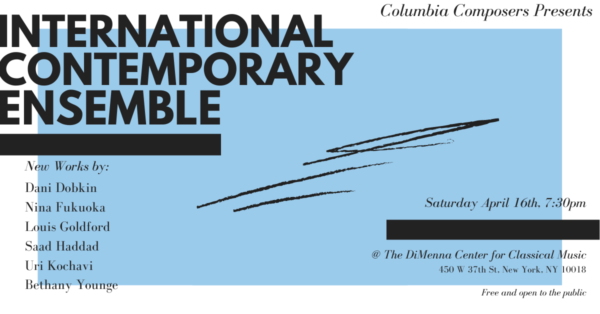
My newest piece with text by William Ruiz Morales, Restless, premieres tonight, April 16th, at the DiMenna Center for Classical Music.
I’m so excited for this performance as this is the first live performance of my piece within the Columbia Composers concert series. Our 2019-2020 Season was upended due to the outbreak of the COVID-19 pandemic, and during the 2020-2021 Season we decided to organize studio recordings for safety reasons.
Restless is a collaboration between myself and William Ruiz Morales, a long time friend and former New Yorker. We’ve been discussing the concepts behind the work for a couple of years now, and Restless is our first step to create a music theater work expanding on these ideas.
I’m so grateful to work with wonderful musicians and specialists at the International Contemporary Ensemble: Isabel Lepanto Gleicher, Ryan Muncy, Rebekah Heller, Kyra Sims, Sam Jones, Nathan Davis, Daniel Lippel, Josh Modney, Meaghan Burke, Randall Zigler, Alice Teyssier, Nicholas DeMaison, Nicholas Houfek, Maciej Lewandowski, Ross Karre, Bridgid Bergin. Thank you to Jay Sorce from Hypercube Ensemble for stepping up to replace Dan Lippel in the very last minute and saving the day.
Come listen to the intriguing work by my colleagues Bethany Younge, Dani Dobkin, Louis Goldford, Saad Haddad, Uri Kochavi.
Thank you to my colleagues from Columbia Composers, especially Anna-Louise Walton and Fjóla Evans for organizing this concert. Poster and banner project made by Josh Mastel.
Even thought the tickets to the concert are sold out, you can sign up for the waiting list under this link. Hope to see you there!
Below is the program note by William.
Zombies confront us with the disease. They are the incarnation of irrational violence that is the surplus of our irrational violence. Somehow, they are the afterlife of that violence. They are denied and deny us the possibility to rest. They must keep going, just keep going. No objectives, no hopes, no rationality, just a craving for something that is always disappearing: the end of violence, to be able to stop. We can never understand zombies, they speak a language incomprehensible to us, the language of death and violence. We can only imagine the stories of those zombies: what they do – never what they think.The text for this piece is not what it says it is. It may seem like it’s a small fragment of the zombie language, but it’s not. Instead, the text is a simplified translation, an observation of the rise and steps of a zombie, a familiar image of the incomprehensible nature of the living dead. When the zombies come, it will be too late to learn how to listen.